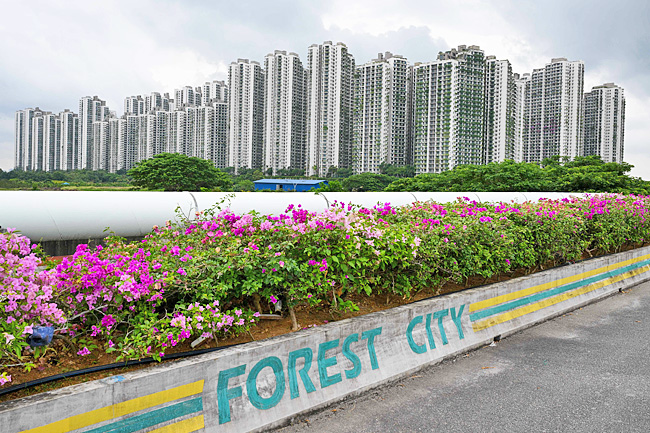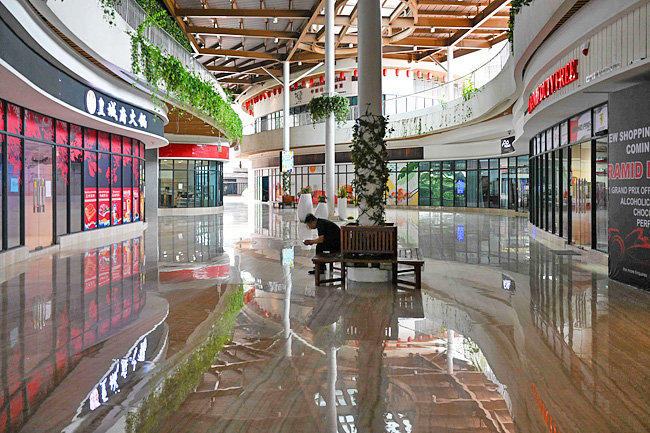FOREST CITY (AFP) – On the approach to Malaysia’s USD100-billion island megaproject backed by Chinese investment, a collapsed bridge forces drivers to detour before they reach an artificial city emerging from palm oil trees where condos, roads and shops lay empty.
Aimed at middle-class Chinese buyers, Forest City has weathered scant sales, Chinese currency controls and a pandemic shutdown.
But its future is in doubt again because of the financial woes of Chinese property giant Country Garden. The project developer rose from a farmer’s idea to Beijing’s largest private real estate firm, but is now saddled with USD196 billion of debt.
It posted a record loss for the first half of 2023 last week but won creditor approval to extend a key bond repayment deadline, narrowly avoiding a potential default that imperilled thousands of developments in and outside the world’s second-largest economy.
Another deadline looms next week over an unpaid multi-million dollar interest payment that again leaves it at risk of default.
“I hope Country Garden can overcome their financial difficulties,” said 29-year-old Zhao Bojian from Chinese province Henan, who bought one of 26,000 Forest City apartments for around USD430,000 five years ago.


“If nobody comes to Forest City, we cannot do business here.”
Sitting across from gleaming city-state Singapore, the sprawling private town in Johor state was one Country Garden’s many ambitious risks that took the company to great heights but now risk crashing it back down to reality.
Launched under China’s Belt and Road Initiative with a company partly owned by a powerful Malaysian sultan, Forest City houses some 9,000 people, below its 700,000 target.
Construction workers chip away at the island city by day while an eerie silence falls over its deserted four-lane highway at night.
Only a small number of lights shine from windows by evening across the project’s more than two dozen high-rise towers.
Below those sit rows of shuttered shopfronts, some with court documents stuck to doors demanding outstanding payments. Inside, rubbish is strewn across the floors.
Many buyers do not live in the artificial city, a security officer told AFP, and instead stash their money as absent owners.
Model sculptures of the completed city’s four artificial islands – far from its current state – sit in the lobby of a sales showroom to attract potential buyers guided by Mandarin, Malay and English road signs.
Previous governments have opposed residency for expat investors, criticising the project as built only for foreigners.
Malaysian Prime Minister Anwar Ibrahim stepped in to try to save Forest City as it threatens to become a white elephant.
Last week, he announced the creation of a “special financial zone” and perks including a special income tax rate and multiple entry visas.
Observers said Forest City faces an uphill battle regardless.
“The liquidity pressure could have an impact on their capability to complete overseas housing projects,” said Bernard Aw, chief Asia-Pacific economist at credit insurance firm Coface.
A three-hour drive from capital Kuala Lumpur, the city attracts visitors who want to catch a glimpse of the space-age towers.
“I will not stay here, it is a ghost town. The road is dark and dangerous and there are no street lights,” said Singapore-based technician Denish Raj Ravindaran, 32.
Much of the activity is foreign workers – many from Nepal or Bangladesh – maintaining the city’s bushes, sweeping its roads or guarding its towers.
An artificial sand beach littered with drink cans where families picnic under coconut trees also bears a sign warning would-be swimmers about crocodiles.
At one 45-storey tower, an official said only two floors are occupied while the rest are for sale.
As Country Garden fights for its survival, drastic efforts will likely be needed – from both Beijing and Kuala Lumpur – to get Forest City on its feet.
“I came here for a holiday after seeing TikTok videos,” said retail clerk Nursziwah Zamri, 30, from Malacca state.
“If you ask me if I would live here, the answer is no.”


